We're an affiliate
We hope you love the products we recommend! Just so you know, we may collect a share of sales or other compensation from the links on this page at no additional cost to you. Thank you if you use our links, we really appreciate it!
German Shepherds are popular among pet parents for their natural protective nature, strength, loyalty, and obedience.
If you’re planning to adopt this large breed dog into your home with children, you may have wondered if Geman Shepherds are good with kids.
The short answer is yes! German shepherds are great with kids and they can do well in different family setups.
Most children would love to have these beautiful family dogs at home for companionship during playtime.
In this article, we have highlighted everything you need to know about the relationship between German Shepherds and kids, and what you can do to introduce them safely.
About the German Shepherd Breed
German Shepherds can trace their history back to 1899 when they were bred as working dogs in Germany to assist in herding and guarding sheep.
These working dogs have since been used to perform other tasks including search and rescue, disability assistance, police work, and warfare.
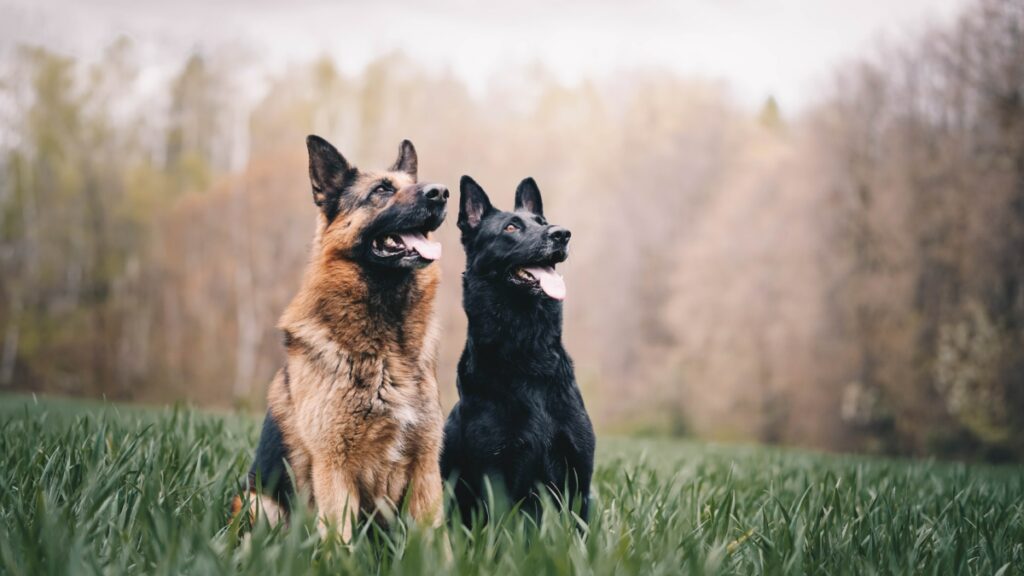
The German Shepherd dogs were officially recognized as a distinctive breed by the American Kennel Club (AKC) in 1908.
Since then, these lovely dogs have found their way into most homes and they are considered one of the most favorite breeds because of their loyalty, obedience, and intelligence.
German Shepherds are still used by law enforcers in their rescue operations because of their stamina and willingness to perform heavy tasks.
Are German Shepherds Good with Kids?
German Shepherds as Family Dogs
German Shepherds are good with kids during day-to-day interactions and they can also protect them from potential attacks.
If you’re planning to add these wonderful working dogs to your home with little ones, then you can be sure that there will be no scuffles between them.
For you to be certain that your German Shepherd will interact well with your children, you need to introduce them properly and socialize them from a tender age.
Interaction between German Shepherds and Children
1. Supervision and training for safe interaction
Despite German Shepherds having a soft spot for children, remember to teach your kids how they should interact with dogs.
Sometimes overstimulated children may provoke calm dogs into anger, and in most cases, it doesn’t end well.
Parents should teach their children to respect the personal space of dogs and not to interfere with them while eating, or sleeping.
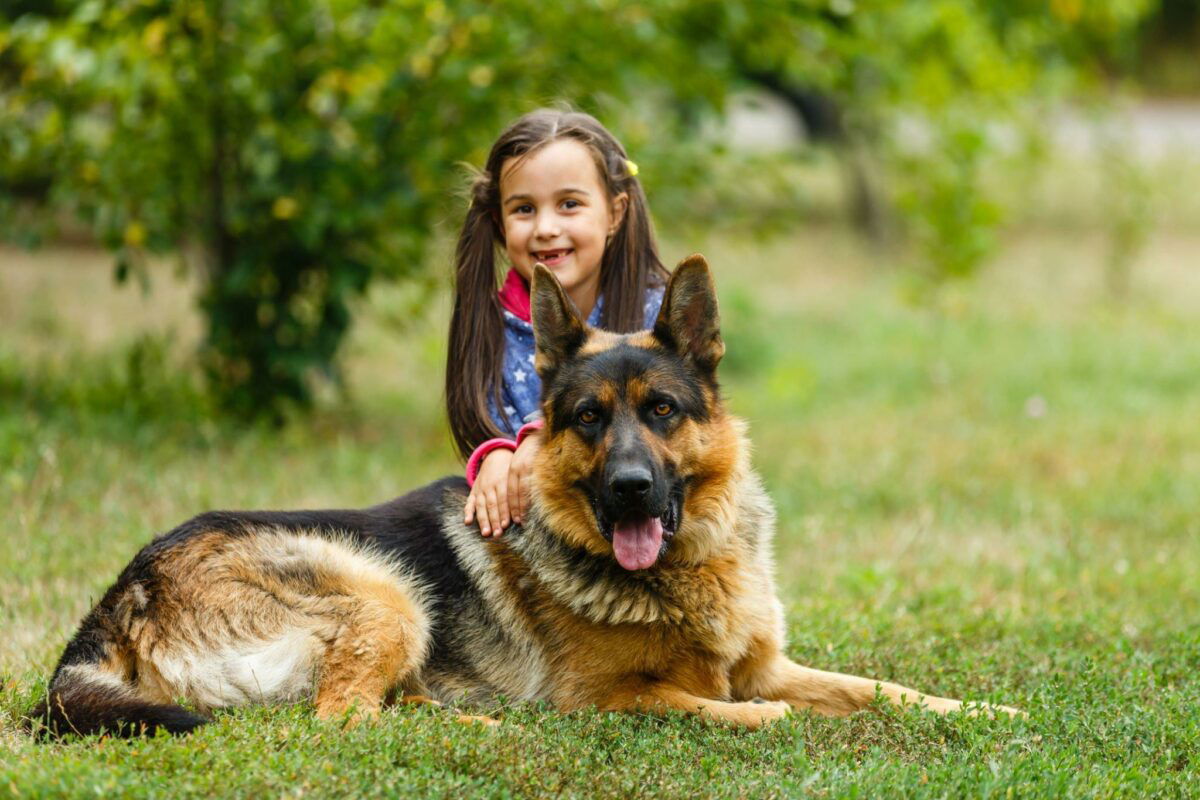
Furthermore, it’s important to train your dog to respect the child’s boundaries and desensitize them to some possible actions they may find cheeky from kids.
Start by training basic commands such as ‘sit and stay‘. This will help in managing the dog during the interactions and recalling them from potentially dangerous situations.
Make sure you supervise all the interactions between your children and the dog to prevent any tension from building up.
2. Socialization and exposure to children
Start socializing your dog with the kids as soon as everything is ready. Social training is a good way of teaching the dog how to handle little humans and exposing them to their tender side.
You should be patient with your kids until they’re about 4 or 5 years old before allowing them to play with dogs.
Children in that age bracket have a better grasp of trainability and it’s easier to teach the limits when interacting with dogs.
Start by gradually socializing them in a controlled environment to help both the child and the dog to build confidence.
Early socialization is important in forming a stronger bond between the canine sibling and the kid as they grow up together.
Factors Influencing German Shepherds’ Behavior with Kids
Despite the impressive disposition of German Shepherds with babies, various factors may influence the overall interaction.
All dogs are different, so pet parents should always understand what their pooch likes and how to positively engage with them.
1. Early socialization and training
Introducing and exposing your dog to the young ones plays a crucial role in shaping their overall behavior during interactions.
We suggest socializing your dog early enough with the kids and exposing them to different interactive situations such as gentle petting, playing, and walking together.
Training your dog consistently in a positive environment will help them form good habits around everyone in the house including the toddlers.
Make sure to teach your dog a set of commands and reinforce good behavior that makes it pleasurable to interact with kids.
2. Breeding and genetics
Your dog’s breeding history and genetics play a very significant role in influencing their general conduct with everyone.
Be careful when choosing your breeder, and go for those who select the dog’s parents by focusing more on the positive traits and good genetics to reproduce desirable puppies.
German shepherds bred from parents with remarkable social skills and gentle demeanor are more likely to create a liking for your children at home.
Poorly-bred German Shepherds are likely to have behavioral issues with unpredictable temperament which is not good for kids.
3. Individual personality differences
Even though the German Shepherd breed may be inclined to form friends with children, remember that every dog is an individual with a unique personality.
Some dogs have a playful nature and they tend to be more open to children and their interactive games, while other dogs are more reserved.
If your dog is not tolerant of children, we suggest taking the introduction slowly and teaching your kids to respect the dog’s boundaries.
4. Owner’s Role in shaping behavior
Believe it or not, your dog’s general behavior is largely dependent on you as the pet parent.
German Shepherds are especially known to be very loyal to their human caregivers, this means that you can play a huge role in shaping your dog’s overall behavior.
The best way of going about this is by consistently training your dog to reinforce good habits, and showing positive emotions when they handle kids with care.
Your dog can read your emotions and when you show a happy face when they play with the kids, the dog will pick up positive cues and reinforce the behavior.
As a responsible dog owner, be sure to provide your German Shepherd with a nurturing environment to create a positive association and build the confidence of your dog at home.
Potential Challenges and Considerations
While the interaction between German Shepherds and children can be smooth, you can expect to come across some challenges, including:
1. German Shepherd’s herding instincts
German Shepherds were originally bred to herd and guard sheep, and they still have these instincts written in their DNA.
These herding instincts can emerge when interacting with kids, where the dog may appear to control the child’s movements.
The herding nature may not be aggressive, but it can be particularly annoying or overwhelming to some children, who may end up confronting the dog.
2. Need for exercise and mental stimulation
With the high energy nature and natural drive to work, German Shepherds need regular physical and mental stimulation to keep them healthy and well-balanced.
Failure to provide your dog with enough exercise may build up lots of pent-up energy which may be redirected to the kids.
3. Resource-guarding tendencies
German Shepherds are naturally territorial dogs and may guard their valuable accessories, spaces, families, or homes.
Male German Shepherds are more likely to show territoriality than female ones, and sometimes it tends to defensive behaviors.
If the children interfere with the dog’s food and toys, or when they sit in their favorite spots, the aggrieved dog may bark, growl, or even bite them in an attempt to guard their goodies.
4. Potential for unintentional injury due to size and energy levels
If you’re welcoming a newborn to your house with an adult German Shepherd, then you need to be cautious about the dangers of excessive games and injuries.
German Shepherds are large dogs known for their sheer power and high energy levels. Such a dog may be overwhelming to a toddler, and they may lead to unintended injuries during interactions.
It’s essential to train your German Shepherd on restraining their strength when playing with kids and inform your kids never to touch the sensitive parts of the dog such as the tail.
5. Allergies and hygiene considerations
German Shepherds are NOT hypoallergenic dogs. They have a double coat that sheds fur moderately throughout the year, but they experience two heavy shedding periods during seasonal changes.
Whenever your beloved canine sheds some fur, they can spread dander around the home, and this may trigger allergic reactions, especially in sensitive babies.
Affected children may show some negative reactions including sneezing, sniffling, runny nose, watery eyes, or skin rashes.
How To Introduce a German Shepherd Dog to Children
Before allowing your kids to play with German Shepherds at will, you must introduce them to a safe environment.
A slow, steady, and positive introduction process can guarantee peaceful interaction in the future and help to build a bond between the child and the pooch.
The following are some of the steps you can follow to ensure a positive experience while adding a new German Shepherd at home:
1. Preparing the home environment
Before bringing your newly adopted German Shepherd home, it’s essential to prepare the environment in readiness to host a canine member.
The first thing you would want to ensure is spacing out enough room for your dog to feel comfortable and contented.
Furnish your dog’s room with a comfy doggy bed, bedding, food bowl, water bowl, and a few interactive toys for an enhanced experience.
Depending on the age of your baby, you need to create a child-friendly space with restricted access for the dog.
This ensures that your little one can feel comfortable without worrying about the unexpected visit by the pooch during certain moments.
2. Teaching children appropriate behavior around dogs
To guarantee a safe interaction between the dog and the child, you need to train your kid on how to behave around their canine sibling.
The following are some of the things to consider:
- Touching the dog gently while avoiding sensitive areas such as the tail.
- Don’t disturb the dog while eating
- Respect the dog’s personal space
- Don’t disturb the dog while sleeping
- Recognize the negative signs of discomfort in dogs, such as growling or barking.
3. Positive reinforcement training techniques
Most German Shepherds naturally tend to have a gentle and loving disposition when interacting with children, so you can be sure to have a good time during training.
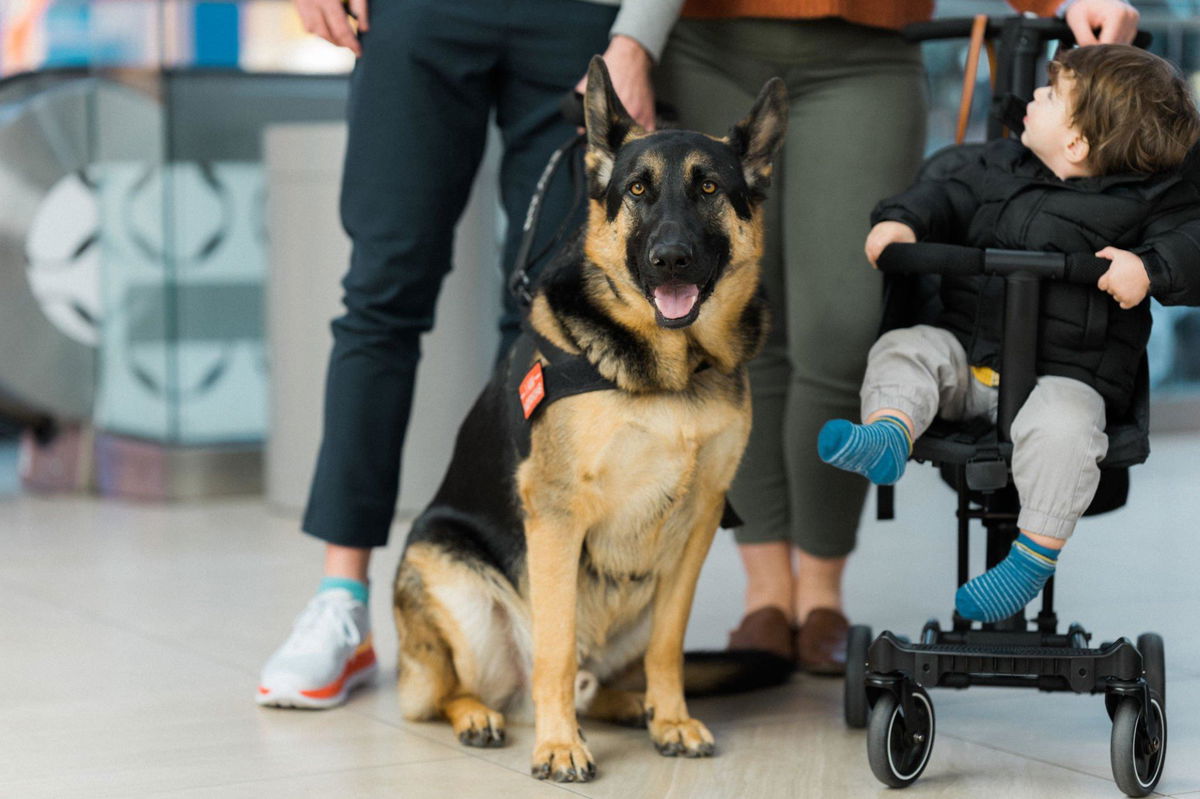
Rewarding your dog with high-value foods is a good way of showing your appreciation and reinforcing good behavior.
You can use a clicker during training to mark the specific actions of your dog, to enhance quick learning and repeatability.
4. Gradual introductions and supervised interactions
Teach your dog that the little one is also part of the family and reward them with treats whenever they behave positively around the child.
It’s important to start small and work your way gradually when the two show positive interactions with excitement.
During the first meeting, you can leash the pup to ensure they don’t jump on the kid since this may cause injuries.
Always monitor and supervise all interactions between the dog and the baby to avoid any scuffle from ensuing.
Remember that your dog is a living creature, so don’t allow your child to play with them as a toy.
Discourage harsh games such as teasing, pulling, or jumping on the dog because it only helps to create a negative reputation and torment the dog.
Observe the body language of the dog and the child to know when they’re accepting the introduction or if something is overwhelming them.
Other Considerations
1. Age of Children and dog compatibility
The age of your young ones will greatly affect how well they can interact with dogs, including German Shepherds.
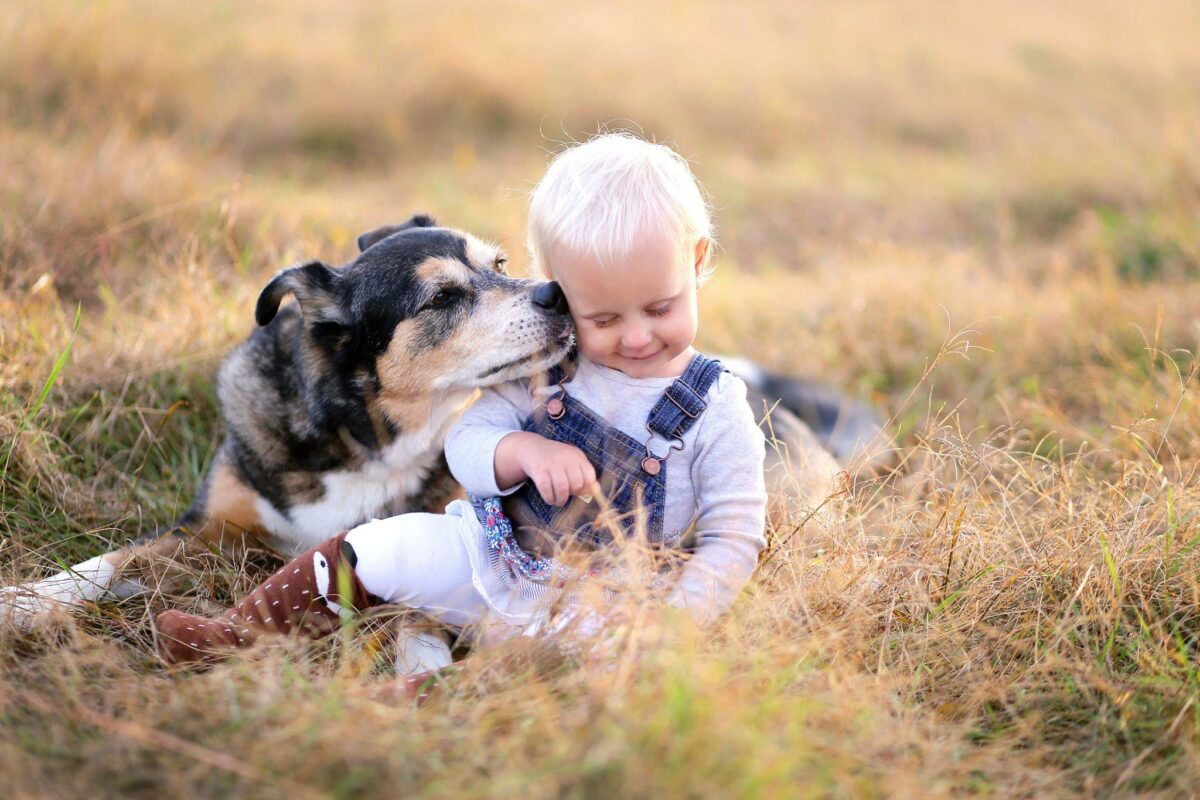
Exposing your child to dogs when they’re between four and five years is recommended because they can be taught what to do and what to avoid.
2. Adoption versus purchasing from a breeder
When deciding to add a new dog to your home, you may have two options of getting them, that is adoption from an animal shelter, or purchasing from a breeder.
Adopting a dog from a rescue organization is a socially accepted way of providing love, care, and a new home to pets.
Many dogs are well-socialized right from the shelter, meaning you won’t have a tough time introducing them to the world.
Purchasing a puppy from a breeder is more expensive than adopting, but it gives you the option of getting the desired qualities in a breed.
A breeder will certainly provide all the relevant details about your preferred puppy including the lineage history, health, and temperament.
If you’ve chosen the purchasing option, we suggest looking for an ethical breeder who prioritizes the health conditions of the dogs and their temperament with humans.
3. Consulting with breeders or rescue organizations
By consulting your chosen breeders or rescue centers, you can get vital information about your prospective German shepherd and their disposition with kids.
You can give the needs of your family and what you really desire in a dog, and the breeder or animal shelter personnel will give you tailored advice on what is best for you.
4. Alternative dog breeds suitable for families with kids
German Shepherds are good family dogs and they can make great friends with kids, but they may not be a fit for your family needs.
The following are some of the other alternative family-friendly dog breeds you can consider adding to your home with children:
- Alaskan Malamute
- Beagle
- Bernese Mountain Dog
- Bichon Frise
- Bulldog
- Collie
- French bulldog
- Golden Retriever
- Irish Setter
- Labrador Retriever
- Newfoundland
- Pitbulls
- Pug
Frequently Asked Questions (FAQs)
1. Can German Shepherds be left alone with kids?
German Shepherds are generally known to be great with kids, but leaving them alone with small kids and babies is not recommended.
Sometimes your dog may perceive something to be gentle play, but it can be too overwhelming for the young ones, so you need to be there for close supervision.
2. Will a German Shepherd attack a child?
While a German Shepherd may not readily attack a child, they can be provoked into anger which can be perceived as a potential threat, leading to an attack.
Even the most well-trained German Shepherd can have accidents during unsupervised interactions with kids.
A misunderstanding from the kid is most likely to provoke a well-socialized dog to attack for protection purposes.
3. Is it better to have a male or female German Shepherd with kids
You can be fine with either gender but for the most part, female German Shepherds are more likely to have a gentler disposition with children than a male one.
They are also motherly by nature and less dominant when engaging with children in various activities.
Male German Shepherds have slightly larger bodies than females, which may appear overwhelming for younger kids.
The male dog may also be too powerful and more assertive during interactions with children, and this may lead to unintended injuries.
Regardless of gender, it is your responsibility to socialize your dog and teach them good habits when interacting with the little humans.
Conclusion
Are German Shepherds good with kids? Yes! These dogs can form great family pets and they’re excellent with kids too.
Despite the inherent nature of becoming friends with babies, you need to carefully introduce your dog to the baby before allowing them to play together.
German shepherds have been used in police work, and this has made them gain a negative reputation for being aggressive.
These beloved dogs will not attack your children unprovoked, so it is on your part to instill good habits and teach your little ones the do’s and don’ts of interacting with dogs.
Laura is the founder of Furs'n'Paws. She is a also a pet writer and expert with more than 20 years of experience of working with dogs and cats. She developed a very strong love for animals at a young age. Her passion led her to establish a thriving pet sitting and dog walking business in Dubai. As an expert in pet training, behavior, and nutrition, Laura is committed to helping pet owners and pet lovers by offering high-quality information on a wide range of topics.


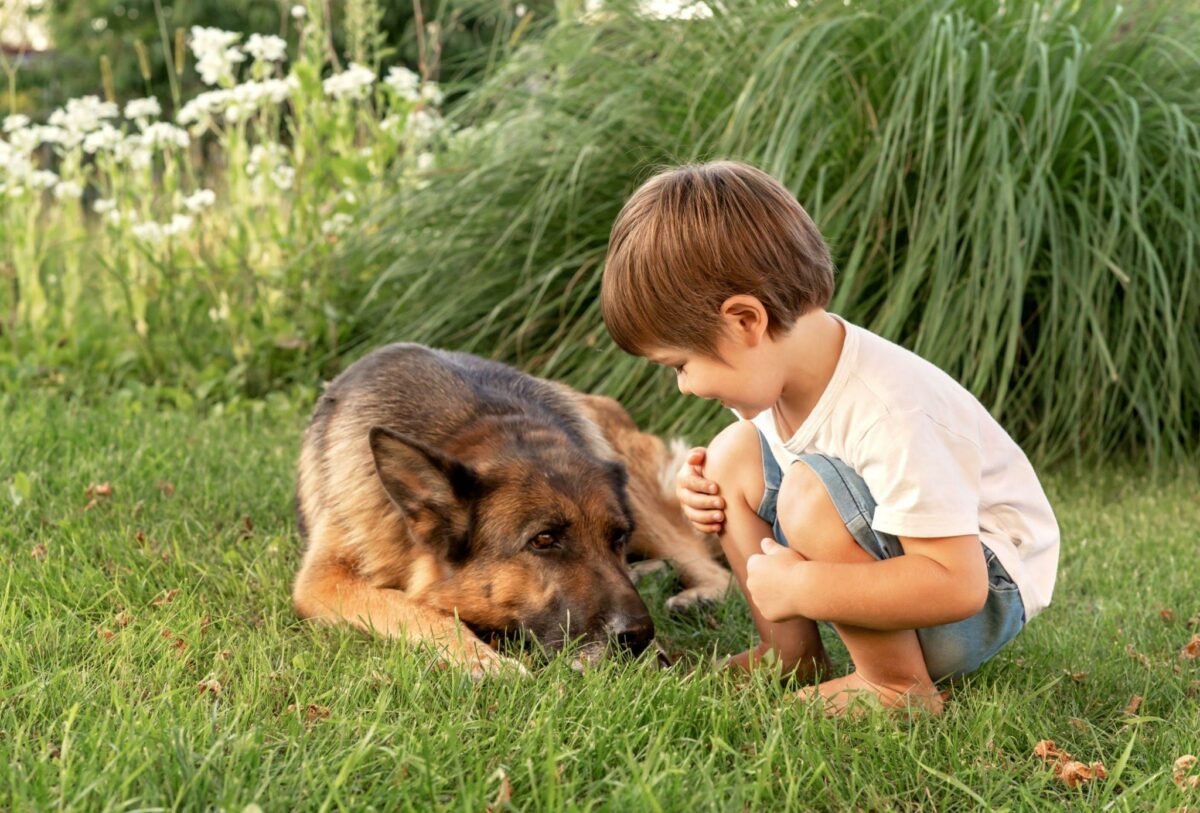
No responses yet